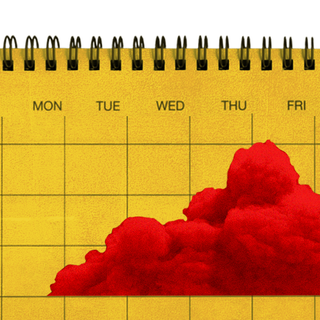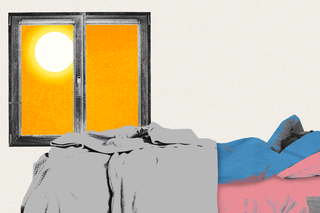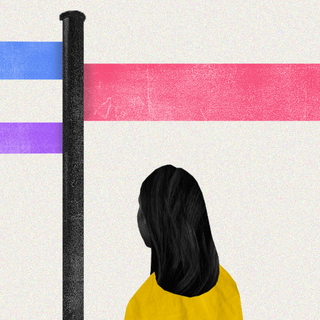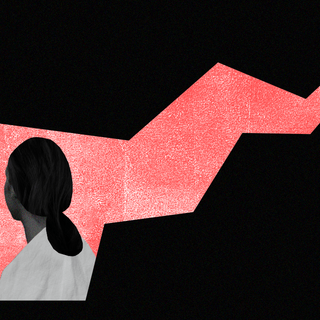
People Are Sleeping Less Because of High Temperatures Globally, Shows Research
“Our bodies are highly adapted to maintain a stable core body temperature, something that our lives depend on.”

In 2019, playwright Finegan Kruckemeyer imagined a circuit breaker for climate crisis with his play Hibernation: a world where people could plunge into a deep slumber to evade the catastrophe of heatwaves, floods, and extreme weather. The global threat could be addressed if people would just sleep. Yet, Kruckemeyer’s sci-fi quickly becomes a dystopic tragedy as we realize how global heating is disrupting sleep cycles.
New research shows rising temperatures due to climate change are depriving people of sleep globally. Published in the journal One Earthlast week, the study provides “the first planetary-scale evidence that warmer than average temperatures erode human sleep,” said Kelton Minor, at the University of Copenhagen, Denmark, who led the research. “It might actually be the tip of the iceberg, because it’s very likely our estimates are conservative.” The research looked at data from more than 47,000 people spread across 68 countries — including countries like India, China, Colombia, and South Africa — and analyzed their sleep tracker records.
To be precise, an average person is already losing 44 hours of sleep a year, which adds up to about 11 nights with less than seven hours of sleep. On very warm nights, when the temperature was greater than 30 degrees celsius, the average sleep duration declined by 14 minutes. If fossil fuels and other carbon-intensive emissions continue by way of present standards till 2099, researchers predict hot nights could take away up to 58 hours of sleep per person per year. The lost sleep may particularly harm women and elderly individuals more, making them more vulnerable to poor health.
Here’s what we know about sleep patterns: people spend nearly a third of their lives sleeping. We also know the human body needs to cool every night as it falls asleep; any disruption (too hot, too cold) can disrupt the sleep cycle. “Our bodies are highly adapted to maintain a stable core body temperature, something that our lives depend on,” the researchers noted.
“Yet every night they do something remarkable without most of us consciously knowing – they shed heat from our core into the surrounding environment by dilating our blood vessels and increasing blood flow to our hands and feet.” This process naturally suffers when the temperature is warmer. If the surroundings are too warm, the body fails to shed as much heat as it should.
Now picture a scenario where the global heating due to climate change has led to massive heatwaves and increasing night-time temperatures globally — a situation where the temperature is increasing at night even faster than it is during the day. People then slept much lesser, according to the present study.
Related on The Swaddle:
How Heatwaves Can Make Us Irritable, Angry, and Even Prone to Suicidal Thoughts
One may be tempted to wonderwhat a couple of lost minutes, or hours, per night, could do to people or society as a whole. Sleep deprivation, however, is linked to everything detrimental to our well-being: poor mental health, reduced immune system functioning, high blood pressure, diabetes, heart attack, heart failure or stroke. Even productivity takes a hit: research shows those who sleep less were found to have “significantly worse productivity, performance, and safety outcomes.”
The lost sleep due to climate change also gives way to a “sleep gap” that affects some more than others. A gender lens shows that women will be more affected in comparison to others; their bodies usually cool faster than men’s due to slight biological variations. It is also a well-documented fact that women’s sleep quality is tangibly lower than their partner’s due to greater family caregiving responsibilities and differences in how they engage with work. For instance, women are more likely than others to wake up to take care of work at home — inevitably disrupting their sleep. Even age is a factor here: older people who have poorer control over body temperature regulation will be impacted because of sleep loss.
Then, there is also a disparity in the way people in middle- and low-income countries experience sleep loss. Areas with lesser access to cooling facilities, like air conditioning and fans, will experience hindered sleep cycles at a mass scale. “Worryingly, we also found evidence that people already living in warmer climates experienced greater sleep erosion per degree of temperature rise,” said Minor. Other research has shown that heatwaves affectpoor urban neighborhoods more than high-income areas, owing to densely-built neighborhoods, poor ventilation, and lack of green spaces.
“And if you look at the heatwave that’s transpiring right now in India and Pakistan, we’re talking about billions of individuals exposed to conditions expected to result in considerable sleep loss.”
One limitation of the study is the under-representation of people from lower-income countries. The people, although, included mostly wealthy middle-aged men, a category more likely to have undisrupted sleep cycles. The true extent of lost sleep is then a deeper toll, and more research is needed particularly in some of the hottest regions globally — such as parts of Africa and the Middle East.
Rising temperatures have unleashed a wave of discomfort, physical stress, and poor health for years now. There remains limited data on sleep patterns — time durations, their link to health and productivity — in nations like India, offering a more nuanced scope than what sleep laboratories in the West offer. One such studyconducted in 2021 looked at low-income families in Chennai, and found that they sleep only 5.5 hours at the night on an average due to disruptions like bad weather and poor surroundings. So while night-time sleep had little benefit on their mental, emotional, and cognitive well-being, afternoon naps made a difference. Those who napped for 30 minutes in a healthy workspace showed an “improved overall index of outcomes by 0.12 standard deviations, with significant increases in productivity, psychological well-being, and cognition,” the researchers noted, because of the availability of a safe space to sleep.
Sleep habits underscore much of who we are and what we do. The research thusnot only speaks to the micro-level impact of how the climate crisis changes people’s lifestyles, but also how there needs to be a reimagining of the way cities and buildings are constructed — all in serviceof reducing the health impacts of rising temperatures. The way we envision our cities and homes then must merge with heat action plans that states implement to navigate the growing heat stress.
“It is hot here but there is a cool breeze and it isn’t hot in the shade and you can sleep at night,” Ernest Hemingway wrote to fellow author F. Scott Fitzgerald; his letters famously captured both a love and yearning for sleep. Hemingway’s observations on sleep carry a universal truth: warm weather is not conducive to a good night’s rest.
As Minor noted: “Our decisions, collectively as societies, will have costs in terms of sleep.”
Saumya Kalia is an Associate Editor at The Swaddle. Her journalism and writing explore issues of social justice, digital sub-cultures, media ecosystem, literature, and memory as they cut across socio-cultural periods. You can reach her at @Saumya_Kalia.
Related


How Travel Distance Decides if Women Get an Abortion
